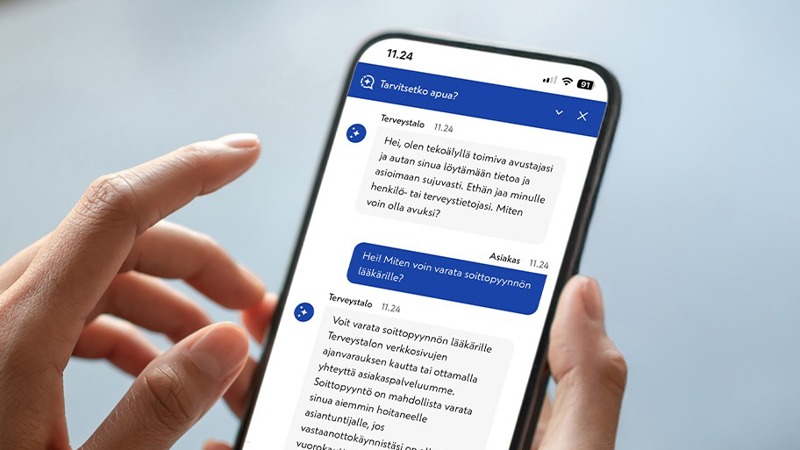The future of work is built on curiosity and amazement – this is how you can boost your learning efficiency
The future working life will challenge our brains in entirely new ways. Organizations and individuals will have to adapt to constant change, where learning, sharing information, and utilizing diverse thinking will take center stage. It is no longer enough to master a single skill thoroughly; curiosity, the ability to innovate, and the skill to creatively combine different perspectives are also required. According to brain researcher Katri Saarikivi, cognitively stimulating work improves brain health, as long as organizations manage to ensure that the workload does not become too heavy.

The success of organizations is strongly based on the development of their personnel's skills. Future working life skills are no longer limited to technical expertise, but emphasize a broader ability to adapt, communicate, and grow together.
"Learning is one of the cornerstones of future working life. The key to acquiring and utilizing new skills are the powerful emotions of curiosity and amazement. These powerful emotions do not arise by chance, but are often the result of a well-designed work environment and the actions of supervisors, Saarikivi explains.
Supervisors have a significant responsibility to create an atmosphere that promotes learning in the workplace. This is a matter of both structures and attitudes: how the workplace views new learning, how it views mistakes and development, and what opportunities for learning are offered.
"The brain must be able to navigate uncertainty, quickly absorb new information, and genuinely learn from mistakes. This requires the courage to experiment, take risks, and build trust in a community where even failures are seen as a source of development. At the same time, finding meaning and motivation in everyday life is emphasized, as the brain needs to recognize why one's work is important and how one's contribution is linked to the bigger picture, says Saarikivi.
From the perspective of work design, learning is promoted through practices that support continuous learning, diversity of voices, and the full utilization of human potential.
“Workplaces need space for questions, insights, and collective thinking. Only then can we build organizations that not only survive change but also thrive and renew themselves in the process, Saarikivi says.
Recent brain research has confirmed the essential role of intrinsic motivation in learning and professional development. When people feel that their work is meaningful and they can influence their own learning, the brain activates reward systems that support learning.
“This natural joy of learning is not based on external rewards but arises from insight, curiosity, and learning new things. Neurological studies show that in such cases, the brain is more receptive to feedback and able to form new connections more effectively, which in turn reinforces the feeling of learning. Supporting this kind of motivation in the workplace does not require a great deal of effort: simply having the opportunity to try new things and share insights with the team stimulates the brain and lays the foundation for continuous development, Saarikivi explains.
Practical tips for supervisors on strengthening learning
1. Create space for curiosity and questions
Encourage team members to ask questions and express their own ideas. New ideas and perspectives often arise from curiosity and open discussion. When questions are allowed without fear of failure, the effectiveness of learning is enhanced.
2. Encourage experimentation and learning from mistakes
The workplace must be a place where it is okay to try and make mistakes. Supervisors can emphasize that mistakes are part of the learning process and can lead to valuable insights. A culture of experimentation, where new things can be tested safely, is conducive to effective learning.
3. Provide feedback and recognize successes
Managers can actively give feedback and highlight the successes of their staff. Feedback helps people understand where they have succeeded and where there is still room for learning. Receiving recognition motivates people to continue on the path of learning.
4. Support finding meaning
Effective learning moments are deeply connected to the meaningfulness of work. Help your team members recognize why their work and learning are important to the whole and how their individual contributions affect the bigger picture.
5. Create a sense of community and opportunities for sharing
Shared learning moments, team meetings, and workshops are opportunities for peak learning experiences. Supervisors can organize discussions where insights, experiences, and tips are shared, thereby strengthening the skills of the entire team.
Read more occupational health articles

What is metabolic age and why should you care about it?
A new laboratory study by Terveystalo reveals how your body is aging. Metabolic age makes biological aging visible.

Smooth assistance for your needs – our AI assistant is now at your service
You can now find Terveystalo’s AI assistant on our website — a quick and easy way to get answers based on the information available on our site. For now, the assistant is available only on the Finnish‑language section of our website, but you can chat with it in English.

How technology helps relieve mental stress: "When the load is high, the threshold must be low."
Mental health disorders have overtaken musculoskeletal disorders, which had long been the leading cause of sick leave. Work is changing, and the range of sick leave caused by mental health issues has also changed. We must be able to offer new solutions to this challenge.

Extensive data set of 200,000 samples: Nightingale study reveals link between illness risks and sick leave
Data from the Finnish Nightingale study, which is used in Terveystalo's occupational health services, reveals a clear link between lifestyle-related health risks and sick leave. The exceptionally extensive data set of over 200,000 customers shows that people with a low risk of illness had significantly fewer absences, while those in high-risk groups had more absences. The results highlight the importance of preventive healthcare in ensuring work ability and the competitiveness of companies.

Strong identification speeds up your service experience when calling us
Soon you can identify yourself easily and securely before your call is answered. Read below to see how the identification process works.

Terveystalo's digital services have been awarded the internationally recognized ISO27001 information security certification.
Terveystalo's information security practices, processes, and risk management are in line with international best practices.